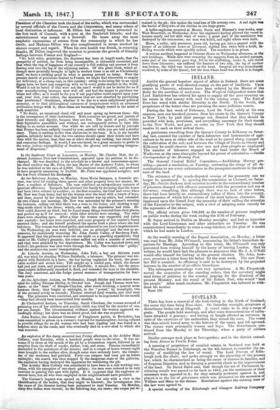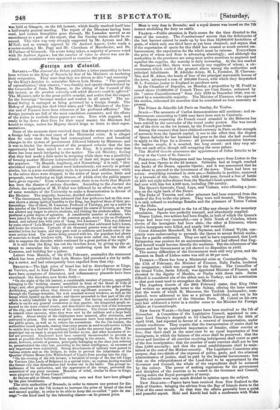SCOTLAND.
There has been a renewal of the food-rioting in the North of Scotland; the scene this time being Ross-shire. On Saturday sennight, symptoms of disturbance broke out at Dingwall. A vessel came in to ship a cargo of grain. The people held meetings, and after some demonstrations of turbu- lence attacked a granary; and having at length effected an entrance, in spite of the exertions of the authorities, they mixed the corn. The vessel was then seized, towed away to the bottom of the canal, and left aground. The rioters were principally women and boys. The disturbances con- tinued from the Monday to the Thursday, when a party of soldiers arrived.
Similar outrages took place at Invergordon; and in the district extend- ing from Alness to Fowlis Point.
A meeting of proprietors of entailed estates in Scotland was held at the Waterloo Rooms in Edinburgh, on the 4th instant, to consider the ne- cessity of modifying the law of entail. The Lord Provost of Edin- burgh took the chair; and spoke strongly on the absurdity of the present law, which he characterized as being the cause of distress in families, and of frequent litigation, and as forming a powerful check to the improvement, of the land. Sir David Baird said, that though the act of Parliament in- stituting entails was passed so far back as 1685, yet the sentiments of their ancestors were opposed to it; for they actually protested against it, and placed it in the list of grievances which was presented on the accession of William and Mary to the throne. Resolutions against the existing state of the law were agreed to.
A special meeting of the Edinburgh and Glasgow Railway Company was held at Glasgow, on the 5th instant; which finally resolved itself into a half-yearly general meeting. The report of the Directors having been read, and certain formalities gone through, Mr. Lumsden moved as an amendment to a part of the report, that the Sunday trains should be re- sumed. This view was very strongly supported by Mr. Aytoun and Mr. and as warmly opposed by Sir Andrew Agnew, (who made a counter-motion,) Mr. Pegg and Mr. Cheetham of Manchester, and Dr. bi'Farlane of Greenock. On a vote being taken, a majority of persons voted with Sir Andrew Agnew; but the number of votes in shares was not de- clared, and scrutineers were appointed to examine the proxies.



























 Previous page
Previous page